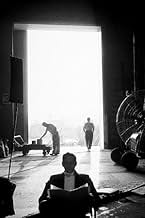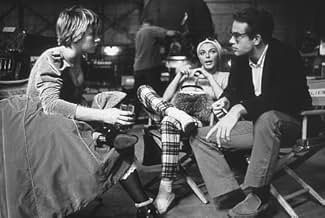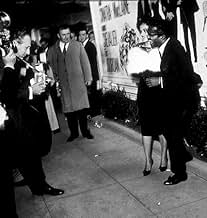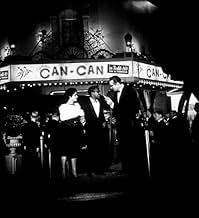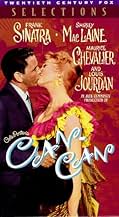IMDb RATING
6.3/10
2.7K
YOUR RATING
In 1896 Paris, a female nightclub proprietor fights against the forces of public morality for the right to feature her performers doing the risqué dance, the Can-Can.In 1896 Paris, a female nightclub proprietor fights against the forces of public morality for the right to feature her performers doing the risqué dance, the Can-Can.In 1896 Paris, a female nightclub proprietor fights against the forces of public morality for the right to feature her performers doing the risqué dance, the Can-Can.
- Director
- Writers
- Stars
- Nominated for 2 Oscars
- 5 wins & 7 nominations total
Frank Baker
- Party Guest
- (uncredited)
Benjie Bancroft
- Club Patron
- (uncredited)
Herman Belmonte
- Waiter
- (uncredited)
Shirley Blackwell
- Townsfolk
- (uncredited)
Eugene Borden
- Police Officer Chevrolet
- (uncredited)
Buddy Bryan
- Dancer
- (uncredited)
Carole Bryan
- Gigi
- (uncredited)
- Director
- Writers
- All cast & crew
- Production, box office & more at IMDbPro
6.32.6K
1
2
3
4
5
6
7
8
9
10
Featured reviews
A high good time!
I was all set to dislike "Can-Can" for a variety of reasons (not the least of which is Frank Sinatra cast in a musical set in 1896 France...Frank Sinatra??), but the film is a lot of fun. Sinatra and Shirley MacLaine are in good spirits throughout this pleasing adaptation of the stage-success about a dance-hall proprietress who defends her right to perform the scandalous title-named dance, deemed lascivious in its day. It runs a little too long, and MacLaine is more comfortable in her love scenes with Ol' Blue Eyes than with Louis Jourdan (who doesn't match up well with Shirley at all--he looks puny next to her), but otherwise it's surprisingly enjoyable and Juliet Prowse gives her small part as a dancer a great deal of zest. **1/2 from ****
Can-Canning Without a Can Opener
Well, Can-Can is not a total loss, but it's not a 10-star gem of a movie either, but - it IS entertaining, but the biggest problem that I see with the film is that everyone looks like they're embarrassed to be in the movie with each other because no one is actually looking at each other when they're saying their lines. Look at the scene where Shirley McClain is making up the story as to how Louis Jourdan was trying to overcome her sexually and the scene goes something like this:
SHIRLEY: And I fought him and fought him and stuggled, but what could a person do? MAURICE: [embarrassed to say] Uh - submit - of course! SHIRLEY: [slightly glances at thim and them says loudly] SUBMIT?
The film just kinda lays there and doesn't do anything. Come on - it's not Gigi! It was really a re-uniting of Louie and Maurice because of their hit movie Gigi and that's about where the uniting ends, but there are some highlights to the film. Shirley McClaine's apache dance with the guys while Louis Jourdan looks on is a great number, and the Adam and Eve Ballet is quite good and Shirley's line before the ballet is wonderful when she says something like this: "Be it known that sin may have been invented in the Garden of Eden, but it was perfected in Monemart!"
It just seems like all they're doing in the film is walking through their dress rehearsal without putting any oomph into the acting, and at the same time the some of the costumes are so tacky that they look like we did as kids when we played dress-up as adults! And, look at the scene before Maurice and Louis sing "Live and Let Live". It looks like it was inserted on purpose so that they could have the opportunity to sing the song, and the scene in which Maurice sings "It Was Just One of Those Things". Even that looks like it was inserted on purpose just to give him a chance to sing a song, but the songs are great even though most of them were never in the original broadway play such as "You Do Something To Me", "Let's Do It", and "It Was Just One of Those Things", "It's Alright With Me" [which is slow and a very boring rendition], and oddly enough "I Love Paris" a duet between Frank Sinatra and Maurice Chevalier was deleted from the movie and only heard in the the original soundtrack album, and the Oveture and beginning Credits of the video, that is if you have the first video version of Can-Can in which you get the Oveture, Intermission Music, and Exit Music with all the musical numbers letter-boxed, and why they deleted "I Love Paris" from the movie is beyond me since it was the hit of the show. Again, Hollywood has been known to do some dumb stuff!
Juliet Prowse's big number "Maids From France" is quite good, but it's obvious why she's in the scene with Frank Sinatra when he sings "It's Alright With Me" because at that time they were having an affair, and I guess if it was alright with them it should be alright with us, but later he would marry Mia Farrow and since Frank was Italian it was only obvious that his kids would call her "Uh-Mama Mia"!
Anyway, I sure wish they would re-release the original video version of "Can-Can" or a whole widescreen version on D.V.D.. Other songs from the Broadway Show were deleted from the movie such as "Never Give Anything Away" "Al-e-Vou-Zon" [which is only used in Shirley McClains apache dance as a melody] "There Is No Trick To A Can Can" which is just used as a melody for the Can-Can at the end of the movie, and again even though they deleted a singing version of the hit of the play "I Love Paris", at least they use the melody of it in the Adam and Eve Ballet, but Shirley McClains drunken version of "Come Along With Me" is delightful, and here goes the insanity of Hollywood again, at the end of the film when the Paddy-Wagon is pulling away with Shirley and Frank in it - the chorus is singing the last lines of "I Love Paris"!
So - why didn't Louis get Shirley in the end? Well, it's obvious that she was in love with Frank Sinatra all the time, but more than that; "Once a Rat Packer; always a Rat Packer"!
SHIRLEY: And I fought him and fought him and stuggled, but what could a person do? MAURICE: [embarrassed to say] Uh - submit - of course! SHIRLEY: [slightly glances at thim and them says loudly] SUBMIT?
The film just kinda lays there and doesn't do anything. Come on - it's not Gigi! It was really a re-uniting of Louie and Maurice because of their hit movie Gigi and that's about where the uniting ends, but there are some highlights to the film. Shirley McClaine's apache dance with the guys while Louis Jourdan looks on is a great number, and the Adam and Eve Ballet is quite good and Shirley's line before the ballet is wonderful when she says something like this: "Be it known that sin may have been invented in the Garden of Eden, but it was perfected in Monemart!"
It just seems like all they're doing in the film is walking through their dress rehearsal without putting any oomph into the acting, and at the same time the some of the costumes are so tacky that they look like we did as kids when we played dress-up as adults! And, look at the scene before Maurice and Louis sing "Live and Let Live". It looks like it was inserted on purpose so that they could have the opportunity to sing the song, and the scene in which Maurice sings "It Was Just One of Those Things". Even that looks like it was inserted on purpose just to give him a chance to sing a song, but the songs are great even though most of them were never in the original broadway play such as "You Do Something To Me", "Let's Do It", and "It Was Just One of Those Things", "It's Alright With Me" [which is slow and a very boring rendition], and oddly enough "I Love Paris" a duet between Frank Sinatra and Maurice Chevalier was deleted from the movie and only heard in the the original soundtrack album, and the Oveture and beginning Credits of the video, that is if you have the first video version of Can-Can in which you get the Oveture, Intermission Music, and Exit Music with all the musical numbers letter-boxed, and why they deleted "I Love Paris" from the movie is beyond me since it was the hit of the show. Again, Hollywood has been known to do some dumb stuff!
Juliet Prowse's big number "Maids From France" is quite good, but it's obvious why she's in the scene with Frank Sinatra when he sings "It's Alright With Me" because at that time they were having an affair, and I guess if it was alright with them it should be alright with us, but later he would marry Mia Farrow and since Frank was Italian it was only obvious that his kids would call her "Uh-Mama Mia"!
Anyway, I sure wish they would re-release the original video version of "Can-Can" or a whole widescreen version on D.V.D.. Other songs from the Broadway Show were deleted from the movie such as "Never Give Anything Away" "Al-e-Vou-Zon" [which is only used in Shirley McClains apache dance as a melody] "There Is No Trick To A Can Can" which is just used as a melody for the Can-Can at the end of the movie, and again even though they deleted a singing version of the hit of the play "I Love Paris", at least they use the melody of it in the Adam and Eve Ballet, but Shirley McClains drunken version of "Come Along With Me" is delightful, and here goes the insanity of Hollywood again, at the end of the film when the Paddy-Wagon is pulling away with Shirley and Frank in it - the chorus is singing the last lines of "I Love Paris"!
So - why didn't Louis get Shirley in the end? Well, it's obvious that she was in love with Frank Sinatra all the time, but more than that; "Once a Rat Packer; always a Rat Packer"!
Chic, sparkling musical!
Strangely enough, the weakest aspect of this musical is the quality of the songs. Most of them are fairly mediocre, and fail to stay in the memory for long. But otherwise, "Can-Can" is a smashing entertainment. Lavishly produced and gorgeously photographed, this is one expensive movie where the money were spent with care and taste (unlike, for example, "Gentlemen Prefer Blondes" which, despite its big budget, looked cheap). The story may be a little thin, but it's suspenseful, too: you can never predict with absolute certainty if MacLaine will choose Sinatra (who is wonderful) or Louis Jourdan (who is as sly and charming as he was when he played the villain in "Octopussy"). But above everything else, this movie is a feast for the eyes!
Ring-a-Ding, Ding, Ding
Another Cole Porter Broadway show makes it Hollywood, but not intact. Can Can retained most of its score, but 20th Century Fox added some other Porter standards like Let's Do It. Just One of Those Things, You Do Something To Me. And of course the book was sanitized by the Hollywood censors.
Briefly the plot is a girl who's a Can Can dancer played by Shirley MacLaine has to choose between two men of the legal profession. Upright judge, Louis Jourdan and less than scrupulous attorney, Frank Sinatra. Maurice Chevalier is an older judge who knows all of them and presides over the film like an avuncular grandfather.
The performers all do justice to the Cole Porter score and the best musical moment is Frank Sinatra's singing of It's All Right With Me. He's singing it to Juliet Prowse who was his main squeeze at the time. It's one of Sinatra's best musical moments on film, a perfect mating of singer and song.
I'm sure glad neither Sinatra or MacLaine attempted any kind of phony French accent. Sinatra tried a Spanish one in The Pride and the Passion and the results were hilarious.
Shirley MacLaine before she came to Hollywood was in the chorus of Can-Can on Broadway so she was a perfect fit for her part as Simone Pistache the cabaret owner where the illegal Can-Can is performed.
For reasons I don't understand a duet with Frank Sinatra and Maurice Chevalier singing I Love Paris was cut, though it remained in the original cast album. Blockheads at Fox, what were they thinking?
It also would have been nice to have some Paris location shooting for this film, it was all done at 20th Century's backlot where Nikita Khruschev paid a historic visit and said this was an example of western immorality and decadence. You couldn't buy that kind of publicity.
Verdict on this film, well as Old Blue Eyes sang:
RING-A-DING DING DING, C'est Magnifique.
Briefly the plot is a girl who's a Can Can dancer played by Shirley MacLaine has to choose between two men of the legal profession. Upright judge, Louis Jourdan and less than scrupulous attorney, Frank Sinatra. Maurice Chevalier is an older judge who knows all of them and presides over the film like an avuncular grandfather.
The performers all do justice to the Cole Porter score and the best musical moment is Frank Sinatra's singing of It's All Right With Me. He's singing it to Juliet Prowse who was his main squeeze at the time. It's one of Sinatra's best musical moments on film, a perfect mating of singer and song.
I'm sure glad neither Sinatra or MacLaine attempted any kind of phony French accent. Sinatra tried a Spanish one in The Pride and the Passion and the results were hilarious.
Shirley MacLaine before she came to Hollywood was in the chorus of Can-Can on Broadway so she was a perfect fit for her part as Simone Pistache the cabaret owner where the illegal Can-Can is performed.
For reasons I don't understand a duet with Frank Sinatra and Maurice Chevalier singing I Love Paris was cut, though it remained in the original cast album. Blockheads at Fox, what were they thinking?
It also would have been nice to have some Paris location shooting for this film, it was all done at 20th Century's backlot where Nikita Khruschev paid a historic visit and said this was an example of western immorality and decadence. You couldn't buy that kind of publicity.
Verdict on this film, well as Old Blue Eyes sang:
RING-A-DING DING DING, C'est Magnifique.
"Can-Can" emerges as a flat soufflé
"Can-Can" is a feeble and obvious attempt to match the wit and high professional gloss of "Gigi." The cast even included Maurice Chevalier, still enjoying the quiet pleasures of old age as a tolerant judge named Paul Barriere, and Louis Jourdan, cast here as an upright young judge named Philippe Forrestier
After Judge Forrestier becomes amorously involved with the café owner Simone Pistache (Shirley MacLaine), and legally involved with her shifty lawyer boyfriend (Frank Sinatra), he is no longer the same man
"Can-Can" is a musical film that virtually embodies the reasons for the decline of the genre in the sixties Except for its appropriately gaudy costumes and for the exuberant performance by dancer Juliet Prowse as a cancan girl, the musical is without joy or genuine style under Walter Lang's unfocused direction
The Cole Porter score reveals the composer at his most ersatz Parisian The two of the central roles are grotesquely miscast: Sinatra, who seems to have arrived to Paris by way of New Jersey, creates no discernible or even vaguely likable character in François MacLaine does well in the musical portions, but her Pistache is simply shrill and unappealing Maurice Chevalier and Louis Jourdan work hard at injecting some life into the dull proceedings Chevalier with his trademark shrugged-shoulders, laissez-faire attitude toward life and love, expressed to such songs as "Live and Let Live" and "Just One of Those Things," and Louis Jourdan with the French charm he displayed so prominently in "Gigi."
For all their efforts, however, Can-Can emerges as a flat soufflé
"Can-Can" is a musical film that virtually embodies the reasons for the decline of the genre in the sixties Except for its appropriately gaudy costumes and for the exuberant performance by dancer Juliet Prowse as a cancan girl, the musical is without joy or genuine style under Walter Lang's unfocused direction
The Cole Porter score reveals the composer at his most ersatz Parisian The two of the central roles are grotesquely miscast: Sinatra, who seems to have arrived to Paris by way of New Jersey, creates no discernible or even vaguely likable character in François MacLaine does well in the musical portions, but her Pistache is simply shrill and unappealing Maurice Chevalier and Louis Jourdan work hard at injecting some life into the dull proceedings Chevalier with his trademark shrugged-shoulders, laissez-faire attitude toward life and love, expressed to such songs as "Live and Let Live" and "Just One of Those Things," and Louis Jourdan with the French charm he displayed so prominently in "Gigi."
For all their efforts, however, Can-Can emerges as a flat soufflé
Did you know
- TriviaIt is explained in the film that the can-can was considered a lewd and lascivious dance (in reality often performed without panties).
- GoofsAbout 34 minutes in, when Philipe tries to close the window in Simone's boudoir, the whole wall shakes as he struggles with the window, indicating that it is a set wall and not a real building.
- Quotes
François Durnais: You look like a broken umbrella.
- Crazy creditsOpening credits prologue: Montmartre-1896
- ConnectionsFeatured in Fred Astaire Salutes the Fox Musicals (1974)
- SoundtracksI Love Paris
(uncredited)
Music by Cole Porter
Lyrics by Cole Porter
Sung by chorus over the beginning and end credits
- How long is Can-Can?Powered by Alexa
Details
- Release date
- Country of origin
- Official site
- Languages
- Also known as
- Jack Cummings' Production of Cole Porter's Can-Can
- Filming locations
- Paris, France(stock footage of the evening barge sequences)
- Production company
- See more company credits at IMDbPro
Box office
- Budget
- $6,000,000 (estimated)
- Runtime
- 2h 11m(131 min)
- Aspect ratio
- 2.20 : 1
Contribute to this page
Suggest an edit or add missing content




